Rogue-Cat Rescuer Sparks Outrage With Audacious Act Of Neutering A Beloved Pet Without Owner's Approval
In a world where stray cats roam and compassionate souls strive to make a difference, our narrator (Original Poster) stands out as a tireless crusader for feline welfare.
Through their non-profit TR program, this dedicated individual selflessly devotes their time and resources to provide much-needed medical attention to these furry friends.
During a recent endeavor, OP found themselves in the midst of an orange cat invasion. Despite the challenges at hand, they managed to rescue three cats from the chaos.
Two of them, though visibly underfed, displayed a friendly nature. However, it was the third feline, a plump, well-groomed, collared fellow, who would soon be at the center of an unexpected turn of events.
In the quest to reunite the seemingly pampered feline with its owners, OP stumbled upon a startling revelation—this furry companion had not been neutered.
In an effort to prioritize the welfare of not only this specific cat but also the larger stray cat population, OP made a difficult decision. They took the cat under their care and arranged for its neutering procedure.
Unexpectedly, the response from the owners was far from what OP anticipated. They accused OP of kidnapping their beloved pet and even held them accountable for their child's nightmares.
As the events unfold, the question arises: Was this ethical dilemma a consequence of a hasty assumption or a failure in timely communication? Find out below as we delve into the full details and uncover the Reddit community's final verdict.
Let's dig into the details

This cat rescuer picked up a stray cat with a tag and dropped it off to be neutered
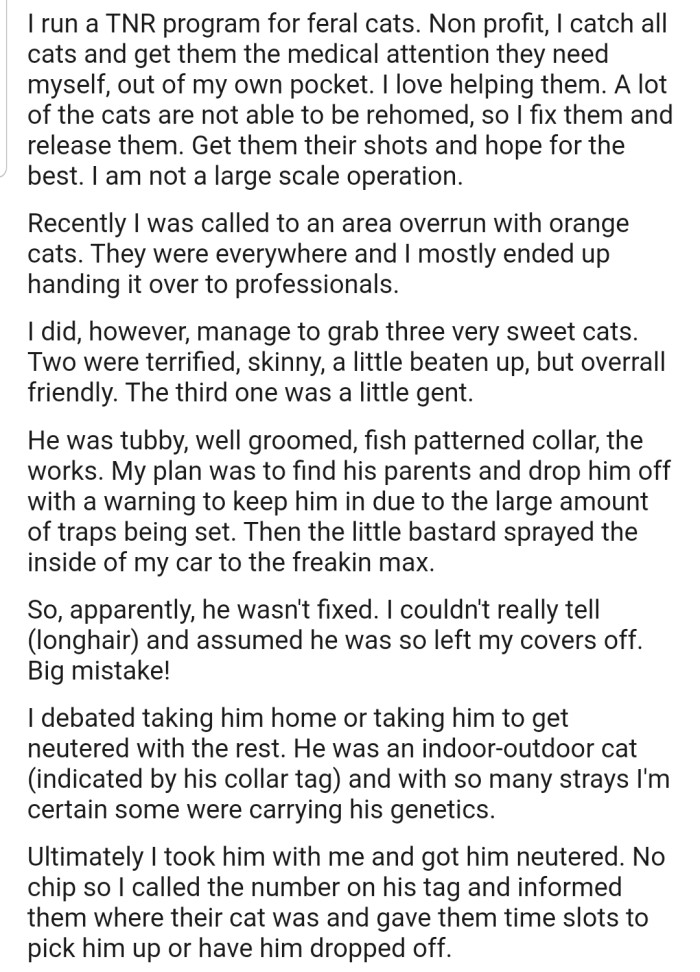
The owners were able to trace their cat to the pickup location. Upon finding out what had happened, they went ballistic at OP for making such a decision without reaching out to them first.
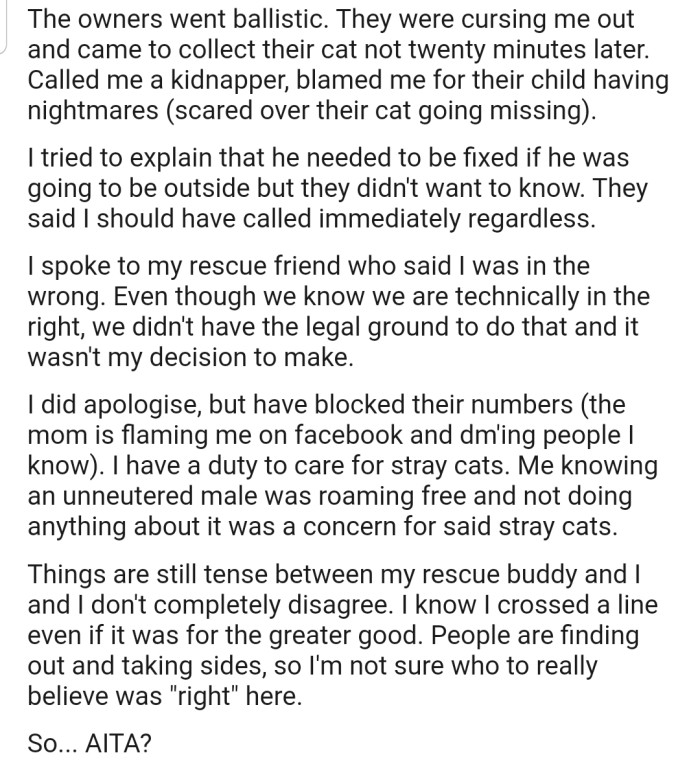
Ethical Dilemmas in Pet Care
The act of neutering a pet without the owner's consent raises significant ethical questions about autonomy and informed consent.
According to research on moral psychology, actions taken without the explicit agreement of others can lead to feelings of betrayal and anger, which are evident in this situation.
This underscores the importance of communication and consent in relationships, even those involving animals.
Ethics in Animal Care Decisions
Animal ethics is a growing field that examines our responsibilities toward pets and the moral implications of our choices.
Dr. James Parker from the University of Toronto emphasizes that interventions like neutering without consent raise critical ethical questions about autonomy and consent in pet ownership.
Research in veterinary ethics suggests that animal welfare must balance individual rights against the perceived benefits of certain medical interventions.
This balancing act can lead to significant public backlash, as seen in this case.
Here's how the Reddit community reacted to the story:
"YTA...You can judge them all you want for letting their cat outside, but the first thing to have done was to call the cat's people."
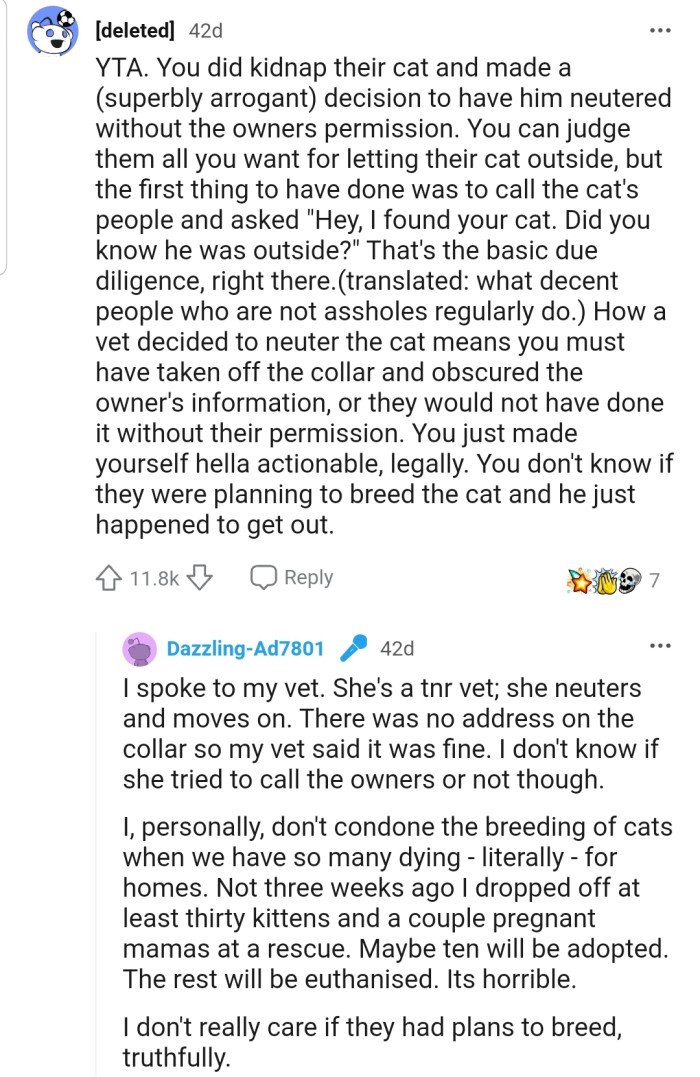
"Making medical decisions for someone else's pet makes you a massive AH. Everyone sucks."
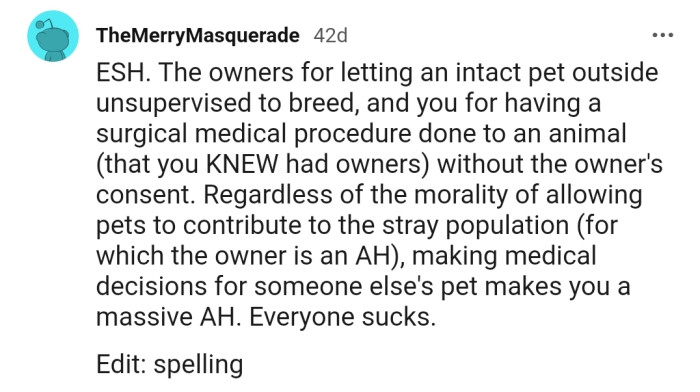
"ESH...It ultimately wasn’t your decision to have him neutered. But they should have had their cat neutered and not let it outside in an area with feral strays."
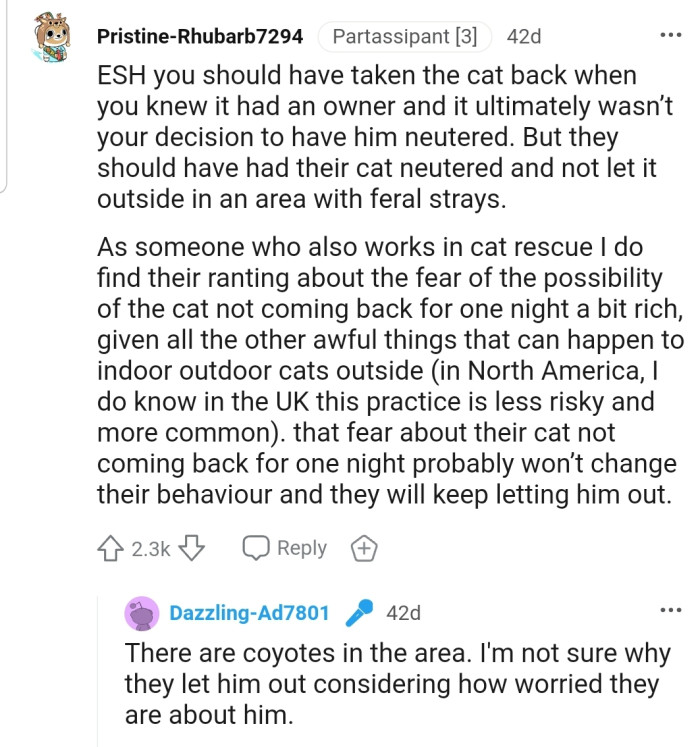
Studies show that pet ownership often comes with a sense of responsibility, which can lead to conflict when differing views on pet care arise.
Conflicts like these can evoke strong emotional responses rooted in personal values about animal welfare and autonomy.
Social norms surrounding pet ownership can create tension when individuals’ values clash, especially regarding decisions that impact the pet's well-being.
Studies indicate that when people perceive a threat to their values or beliefs, they often react defensively, which can lead to polarization.
Engaging in constructive dialogue about differing views on animal care could foster mutual understanding rather than conflict.
"They are irresponsible pet owners and are endangering the community by having an unneutered male cat about."
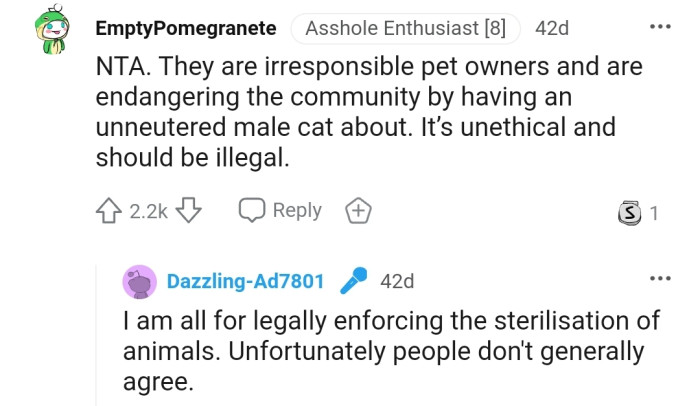
"NTA...They are contributing to the stray cat problem."

"They were irresponsible. You corrected an issue."

Understanding the Community Reaction
The outrage sparked by this incident reflects broader societal values regarding personal property and the rights of pet owners.
Social norms dictate that pet ownership comes with rights, including decisions about health interventions.
This situation can be analyzed through social psychology principles, highlighting how community reactions can shape individual behaviors and perspectives.
Practical Considerations for Pet Care Disputes
When facing disagreements over pet care, it’s essential to establish clear communication and shared values among pet owners.
Creating a shared agreement about pet care responsibilities can prevent misunderstandings and conflicts.
Additionally, seeking mediation from a neutral party can help facilitate discussions and clarify expectations.
Research shows that collaborative problem-solving leads to more sustainable resolutions in conflicts.
"NTA, thank you for your service."

"I know the owners were irresponsible, but you could have educated them when you contacted them about their cat you picked up."
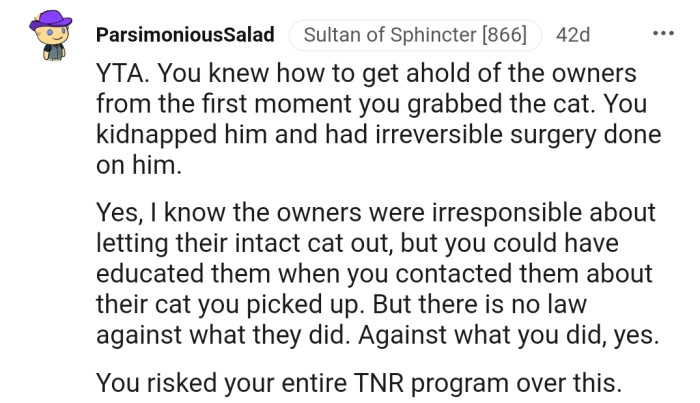
The Reddit community appears divided on this matter. While a majority of Redditors state that OP was wrong, a substantial number of commenters agree that the owners were irresponsible.
Though acknowledging the potential misstep, OP stands firm in their belief that their actions were driven by a genuine concern for the welfare of stray cats.
Regardless of the arguments from both sides, no party escapes criticism. Whose side are you on in this heated debate? Tell us in the comments below.
Psychological Analysis
This incident highlights the complexities involved in pet ownership and how differing values can lead to conflict.
It's important for individuals to consider the emotional implications their decisions have on others involved, especially in community-oriented situations.
Analysis generated by AI
Analysis & Alternative Approaches
Conflicts surrounding pet care decisions often reflect deeper ethical considerations and personal values.
Behavioral research supports the idea that understanding and respecting differing perspectives can lead to more constructive resolutions.
Ultimately, fostering a collaborative approach can enhance animal welfare while respecting individual owners’ beliefs.
To mitigate similar conflicts in the future, it's crucial for pet caregivers to engage in respectful dialogue about pet care decisions.
Creating a pet care agreement that outlines responsibilities and expectations can foster better understanding among all parties involved.
Psychological Analysis
This dispute showcases the complexities of autonomy in pet ownership. It's essential to recognize the emotional weight behind these decisions, as they impact relationships and community perceptions.
Analysis generated by AI
Analysis & Alternative Approaches
In navigating pet care ethics, it's vital to balance individual rights with community responsibilities.
As highlighted in psychological discourse: 'Healthy relationships are built on mutual respect and understanding, especially in shared responsibilities.'



